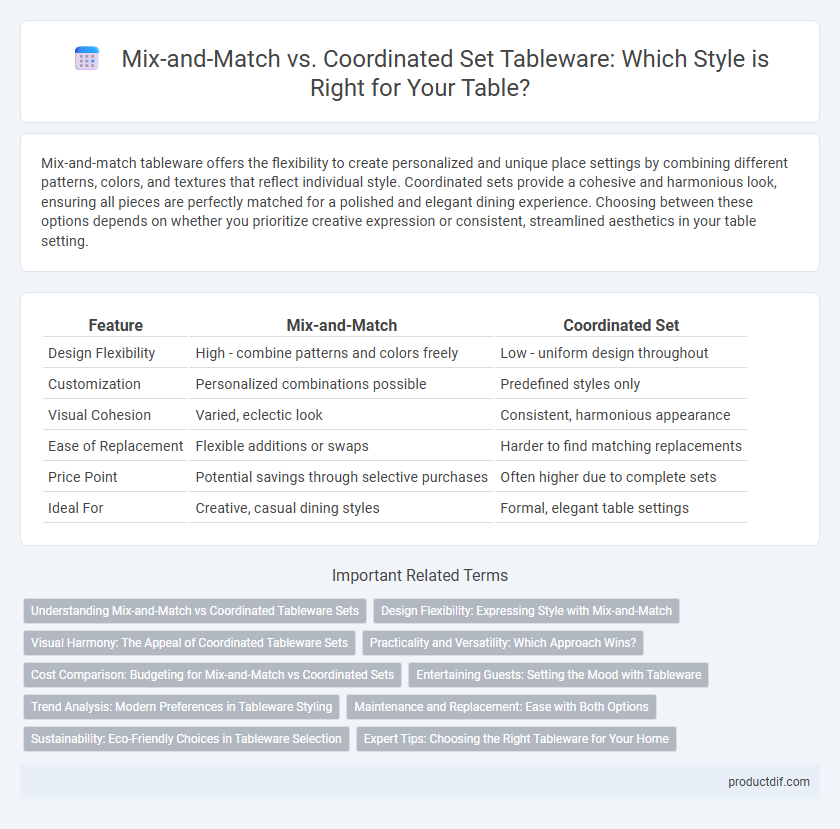Mix-and-match tableware offers the flexibility to create personalized and unique place settings by combining different patterns, colors, and textures that reflect individual style. Coordinated sets provide a cohesive and harmonious look, ensuring all pieces are perfectly matched for a polished and elegant dining experience. Choosing between these options depends on whether you prioritize creative expression or consistent, streamlined aesthetics in your table setting.
Table of Comparison
| Feature | Mix-and-Match | Coordinated Set |
|---|---|---|
| Design Flexibility | High - combine patterns and colors freely | Low - uniform design throughout |
| Customization | Personalized combinations possible | Predefined styles only |
| Visual Cohesion | Varied, eclectic look | Consistent, harmonious appearance |
| Ease of Replacement | Flexible additions or swaps | Harder to find matching replacements |
| Price Point | Potential savings through selective purchases | Often higher due to complete sets |
| Ideal For | Creative, casual dining styles | Formal, elegant table settings |
Understanding Mix-and-Match vs Coordinated Tableware Sets
Mix-and-match tableware sets offer versatility by combining different patterns, colors, and styles, allowing personalized and unique table settings that reflect individual taste and creativity. Coordinated tableware sets provide a uniform and harmonious look with matching pieces designed to complement each other perfectly, ensuring a classic and elegant presentation. Choosing between these options depends on the desired aesthetic, whether it's eclectic charm or cohesive sophistication for dining experiences.
Design Flexibility: Expressing Style with Mix-and-Match
Mix-and-match tableware offers unparalleled design flexibility, allowing individuals to express personal style by combining various patterns, colors, and textures. This approach fosters creativity and uniqueness, breaking the monotony of traditional coordinated sets. It enables seamless adaptation to seasonal themes, special occasions, or evolving aesthetic preferences without the need for an entirely new set.
Visual Harmony: The Appeal of Coordinated Tableware Sets
Coordinated tableware sets create visual harmony on the dining table through consistent patterns, colors, and styles that enhance the overall aesthetic. This uniformity offers a polished and sophisticated appearance, making every meal feel like a special occasion. In contrast, mix-and-match tableware can introduce eclectic charm but may sacrifice seamless visual cohesion.
Practicality and Versatility: Which Approach Wins?
Mix-and-match tableware enhances practicality by offering versatility in design combinations, allowing personalized settings that adapt to various occasions and moods. Coordinated sets ensure uniformity and simplicity, streamlining the dining experience with pre-matched pieces for consistent aesthetics. For dynamic household needs, mix-and-match options often provide greater flexibility and long-term usability compared to traditional coordinated sets.
Cost Comparison: Budgeting for Mix-and-Match vs Coordinated Sets
Mix-and-match tableware offers cost flexibility by allowing gradual additions and combining inexpensive pieces, making it ideal for budget-conscious shoppers. Coordinated sets typically involve a higher upfront cost due to their uniform design and packaging, but they provide a seamless aesthetic with fewer pieces needed. Evaluating long-term use and personal style preferences can help determine which option delivers better value for individual budgeting goals.
Entertaining Guests: Setting the Mood with Tableware
Mix-and-match tableware creates a dynamic, personalized ambiance that encourages creativity and conversation, making guests feel welcomed and relaxed during gatherings. Coordinated sets provide a polished, harmonious look that elevates formality and impresses guests with a unified aesthetic. Both approaches influence the dining experience by setting distinct moods, either casual and eclectic or elegant and refined.
Trend Analysis: Modern Preferences in Tableware Styling
Contemporary tableware styling favors mix-and-match sets that offer versatility and personalized expression, reflecting a shift from traditional coordinated sets towards more eclectic aesthetics. Market data reveals a 35% increase in consumer preference for individualistic, mismatched pieces over uniform collections, driven by trends in casual dining and influencer-led home decor. This evolving trend emphasizes unique textures, colors, and patterns, highlighting modern consumers' desire for creativity and functional adaptability in tableware choices.
Maintenance and Replacement: Ease with Both Options
Mix-and-match tableware offers flexibility in maintenance, allowing individual pieces to be replaced without affecting the overall collection. Coordinated sets streamline maintenance with uniform materials and designs, simplifying cleaning routines and storage. Replacement of coordinated sets can be more costly as entire sets or closely matching pieces may need to be purchased to maintain visual consistency.
Sustainability: Eco-Friendly Choices in Tableware Selection
Choosing mix-and-match tableware reduces waste by allowing for versatile reuse of existing pieces, promoting sustainability through extended product life cycles. Coordinated sets often require purchasing complete collections, which can lead to excess consumption and increased resource use. Opting for eco-friendly materials like bamboo, recycled glass, or biodegradable ceramics further enhances sustainable dining practices.
Expert Tips: Choosing the Right Tableware for Your Home
Mix-and-match tableware offers versatility by combining different patterns, colors, and textures to create a personalized and dynamic dining experience. Coordinated sets provide uniformity and elegance, ensuring harmony across all pieces for formal settings or cohesive decor themes. Experts recommend considering factors such as lifestyle, maintenance, and occasion to determine if a flexible mix-and-match approach or a consistent coordinated set best suits your home's aesthetic and functional needs.
Mix-and-Match vs Coordinated Set Infographic

 productdif.com
productdif.com